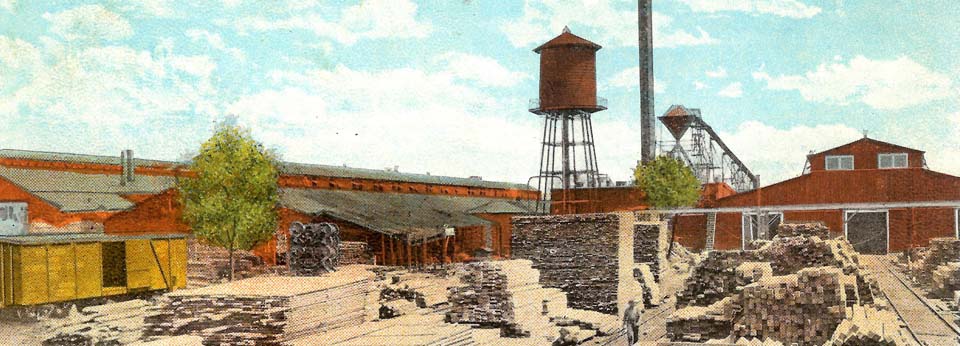
Industry
More Mills
The Lenoir Cotton Mill was a 19th-century cotton mill . One of the earliest examples of industrial architecture in Tennessee, the mill operated variously from its construction around 1830 until the 1950s. The mill was documented by the Historic American Buildings Survey and placed on the National Register of Historic Places in the 1970s. Efforts to restore the mill began in 1980, but before the restoration could be completed, the mill was destroyed.
The Lenoir Cotton Mill was one of several enterprises established by early settler and entrepreneur William Ballard Lenoir (1775–1852). Lenoir moved to the area in 1810 after his father, General William Lenoir, deeded to him the 5,000-acre tract of land comprising what is now Lenoir City.*
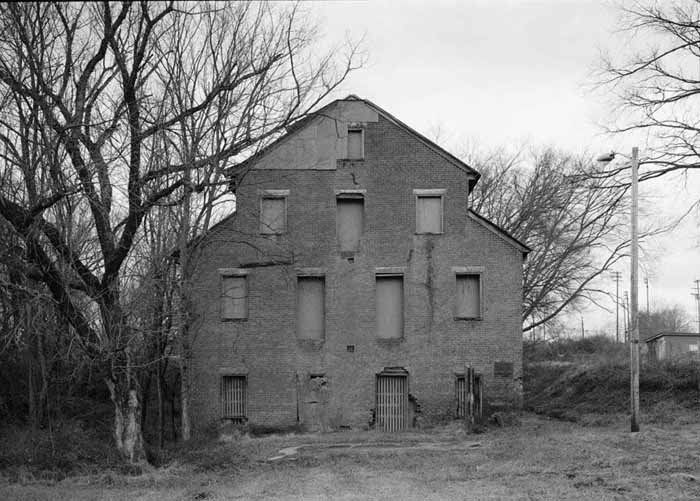
"Lenoir-cotton-mill-front-habs4" by Jack Boucher - U.S. Library of Congress - Historic American Buildings Survey. Licensed under Public Domain via Commons - Link
The younger Lenoir established the Lenoir Manufacturing Company in 1817, which engaged in multiple agricultural and industrial enterprises throughout the 19th century.[2] The cotton mill was completed in the early 1830s and gradually expanded in subsequent decades. During the U.S. Civil War, Union soldiers destroyed parts of the estate of the Confederate-leaning Lenoir family, but spared the mill due to William Ballard Lenoir's son Benjamin's Mason affiliations. After the Lenoir family sold the mill in the 1890s, it operated variously as a hosiery mill and later as a flour mill.[3]
In 1877 the Lenoir Manufacturing Company was chartered by the Legislature of Tennessee. The company owns 3,000 acres of land of which about 1,000 are in cultivation a flouring mill of 150 barrels capacity using the roller process, a cotton factory making cotton yarns and batting, and a large general store. Dr Lenoir is president of the company etc (Source:History of Tennessee from the Earliest Time to the Present ..., Volume 4, p. 1085)
Period of Significance:1830-1890
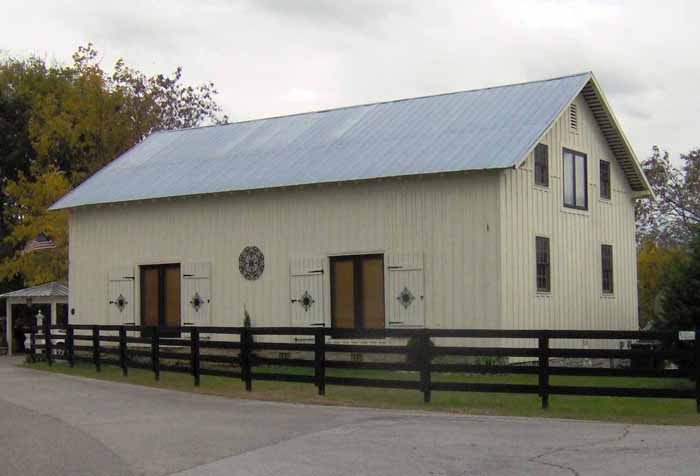
Lenoir Cotton Mill Warehouse "Lenoir-cotton-mill-warehouse-tn1" by Brian Stansberry - Own work. Licensed under CC BY 3.0 via Commons -Link
Loudon County,
Tennessee
Description:
This nomination consists of a single resource, a ca. 1830 one and one-half story timber frame cotton warehouse with brick infill known locally as the Lenoir Cotton Mill Warehouse. Constructed to provide storage space for raw cotton for the newly constructed Lenoir Cotton Mill, it is located at the southern end of the junction of Bussell’s Ferry Road and Lee Drive opposite the confluence of the Tennessee and Little Tennessee rivers in Lenoir City (pop. 6,819), Loudon County, Tennessee. Its unobtrusive appearance belies its early nineteenth timber frame construction and its historical association with the Lenoir Cotton Mill.
Of the numerous mills, warehouses, and houses that were once part of the vast Lenoir estate, the warehouse is one of only two extant resources in Lenoir City, Tennessee. The other is the William Ballard Lenoir family home located approximately one mile north of the warehouse. The Lenoir house has been extensively altered since it was constructed in 1821 and has been converted to apartments. A third Lenoir family property, the Lenoir City Cotton Mill, was built about 1830 and listed on the National Register of Historic Places in 1973. After a ten-year effort to restore and preserve it, the mill was destroyed by arson in 1991 and was removed from the National Register (Lenoir City Webworks 2004). A one and one-half story corner of this two and one-half story brick mill is all that remains standing today as part of a city park. There is one other extant resource associated with the Lenoir family in the county,the ca. 1857 Albert Lenoir House (NR 4/11/73).
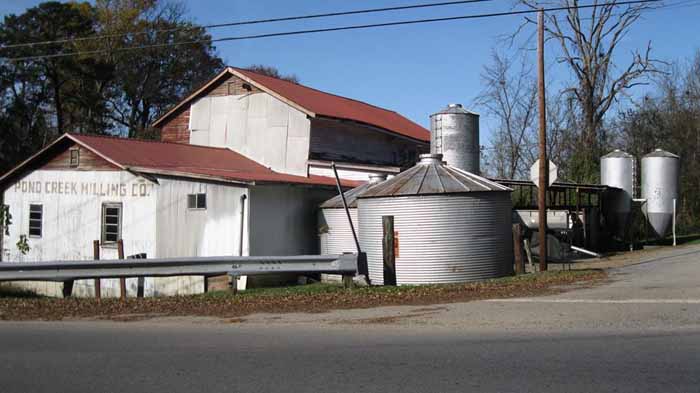
Robinson's Mills (1825-1849)
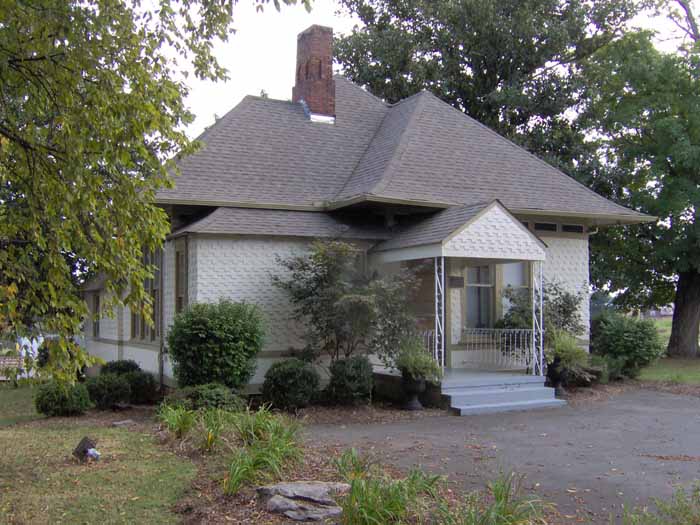 Lenoir City Company "Lenoir-city-museum-tn1" by Brian
Stansberry - Own work. Licensed under CC BY 3.0 via Commons -
Link
Lenoir City Company "Lenoir-city-museum-tn1" by Brian
Stansberry - Own work. Licensed under CC BY 3.0 via Commons -
Link
In 1889, Knoxville railroad magnate Charles McClung McGhee and his friend and associate, Edward J. Sanford, formed the Lenoir City Company, believing the Lenoir estate would be the ideal location for such a town. The company incorporated in April 1890 with $800,000 in stock,[7] and purchased the Lenoir estate, which then consisted of 2,700 acres (1,100 ha), for $300 per acre.[7] When the company issued the stock to the public, the investors each received stock in the company and a lot in the planned town.[9]
Lenoir City was laid out in a grid pattern with four quadrants, west of Town Creek and north of the railroad tracks. The city's northwest quadrant would be a middle class and affluent residential area, whereas the northeast quadrant would be for the city's wage-workers. The southwest quadrant would contain blast furnaces, steel works, and other large factories, while the southeast quadrant would contain woodworking, furniture, and canning factories. Influenced by late 19th-century reform movements that stressed health and temperance, several lots were set aside for public parks, and a large garden area was planned between the railroad tracks and the river.[9]
The Lenoir City Company struggled due to a recession that froze financial markets in the early 1890s. By 1892, the company had only sold 144 of the town's 3,448 lots. McGhee and Sanford persisted, however, and while it never developed in the grand fashion conceived, Lenoir City nevertheless survived. McGhee convinced a rail car company to open a factory in Lenoir City, and a short time later a knitting mill was established. Both establishments still employed several hundred workers in 1910.[10] (Wikipedia)
1902: Lenoir's Station is a post village of Loudon Co Tenn on the Holston River and on the East Tennessee Virginia A Georgia Railroad 20 miles SW of Knoxville. It has a cotton factory, a flour mill, and a church. (Source: Lippincott's Gazetteer of the World: A Complete Pronouncing ..., Volume 1, 1902, p. 1235)
1914: Lenoir City Mills
produced mixed feed. (Tennessee Agriculture ..., Volumes 3-4,
1914, Tennessee. Dept. of Agriculture)
1919: Greenback Mills:
The Greenback Flour
Mill was build in 1919, destroyed by fire in 1929, and rebuilt later
that year.
1922: Town Creek Milling Co
Hood Chair Company
Greenback Mill
In 1954, 133,557 acres or 87 percent of the land area of Loudon County was in farms and 79,977 acres of this was cropland. In the same year 37,011 acres was in woodland of which 12,078 acres was pastured. (Source: Soil survey, United States. Bureau of Soils U.S. Dept. of Agriculture, 1961, pp 107-108)
1959: According to the Rand McNally Commercial Atlas for 1959, there are 28 manufacturers establishments in Loudon County. These factories employ 2,559 people. They consist of a variety of small industrial plants located mainly in Lenoir City, Loudon, Philadelphia, and Greenback. The textile mills at Loudon and Philadelphia appear to be the largest of the factories. Products manufactured include bricks, locks, candy, plastic casings, furniture, hosiery, metallic powder, and lumber. Barite has been mined in the southern part of the county. Crushed rock for construction purposes is produced in a few limestone quarries. At one time there were several marble quarries in the county but most of these are no longer in operation .
Greenback Mill:
Link
Lenior City Calloway
Lbr Co Boxes & Bldrs Sup
Holston Mfg Co Hosiery Mill
Lenoir City Car Works Car Builders
Lenoir City Laundry
Town Creek Mill Co Flour & Meal
Loudon Chair Co Chair Mfrs
Loudon Hosiery Mills Hosiery
Lutz Mfg Co Table Mfrs (Source: Annual Report of the Department of Workshop and Factory Inspection, Tennessee. Dept. of Workshop and Factory Inspection, 1921, p.23)w
Hosiery Mill
Completed Construction
work has been completed on the plant of the Philadelphia Hosiery
Mills at Philadelphia, Tenn and full time operations are expected to
begin soon, 50 operatives to be employed. The mill building is 2
stories high 32x84 feet and cost about $9,000. The mill equipment
including 40 knitting machines, cost approximately $12,000, and has
a daily capacity of 300 dozen pairs of hose. The machinery will be
operated by a 30 horsepower steam power plant belt drive. Robinson &
West are the construction contractors. The mill company was
organized last fall Ed Wallen being one of the officers. (source:
Industrial Development and Manufacturers Record, Volume 8, 1922, p.
86)


